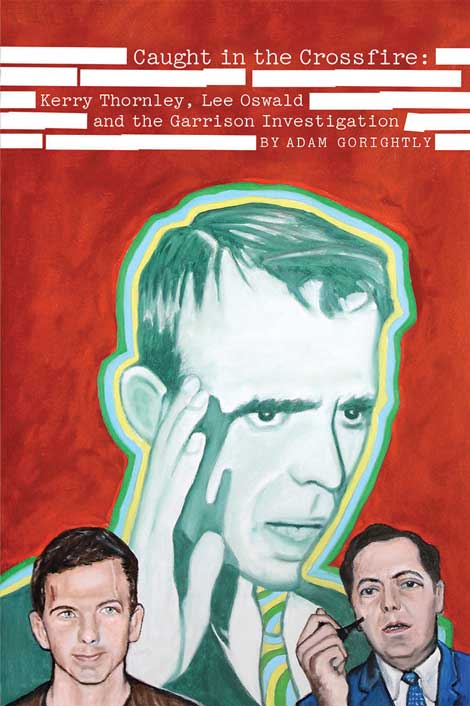In the early ’70s, during the couple of years before punk broke, one of the most exciting subcultural zeitgeists centered around a trio of novels—ostensibly sci-fi—written by former Playboy associate editors Robert Shea and Robert Anton Wilson, detailing the secret war between the Discordian Society and the Bavarian Illuminati that had shaped—and continues to shape—our species’ entire history!
The books were an unexpected cult hit, immediately spawning a 10-hour avant-garde theatrical production in the UK and launching a new conspiracy genre in literature, and arguably sparking the broader conspiracy meme that has since infected the entire culture.
A large part of the Illuminatus! Trilogy’s appeal and influence derive from its mixture of outright satirical paranoia with plausible—even historically verifiable—conspiratorial plottings, so that the boundaries between the two begin to blur. Some of Shea & Wilson’s most outlandish allegations—John Dillinger is alive and well and running the Justified Ancients of Mummu from a bungalow in LA—begin to seem feasible.
The heroic forces of joyous anarchy known as the Discordians (whose struggle with the shadow one-world-government Bavarian Illuminati propels the narrative) seems like a Swiftian invention tailor-made to poke fun at the bizarre psychedelic utopianisms of the era. But the Discordian Society was real, and had been first made public in the late ’50s by a character who could have stepped straight out of the pages of Shea & Wilson’s drug-addled fantasy.
Kerry Thornley was born in LA in 1938, spent a year at USC, then ran off to join the marines. At El Toro Air Station he befriended a skinny contrarian by the name of Lee Harvey Oswald, with whom he would engage in philosophical and political bull sessions, until the two had a falling out, and Thornley shipped out for Japan. This brief acquaintance would come to have an incalculable impact on Thornley’s life.
The fallout from this coincidental—or darkly orchestrated—intersection of the lives (and even identities) of an iconic countercultural literary/philosophical prankster and the alleged assassin of President Kennedy is the subject of Caught in the Crossfire, the second full-length Thornley biography, penned by independent researcher Adam Gorightly.
I can’t begin to recount the stranger-than-fictions compiled in Gorightly’s book, but the subtitle “Kerry Thornley, Lee Oswald, and the Garrison Investigation” hints at how gnarly things were to get. Because he had known Oswald—and even begun writing a novel, before November 23 1963, based partly on Oswald’s defection to the USSR—Thornley was brought in to testify for the Warren Commission.
When New Orleans DA Jim Garrison (Kevin Costner in Oliver Stone’s JFK) started his quixotic legal adventures, he targeted Thornley, ultimately identifying him as one of the Oswald doubles who were gumming up the works. This possibility is still hotly debated on the Internet (Discordianism, too, seems to have an inordinate currency with the web-literate) to this day, in spite of Thornley’s death by heart attack in 1998.
In some sense, Thornley comes across as a martyr to the paranoid cosmic indeterminacy that his faux-mock religion was supposed to worship. Before Oswald ever entered the picture, Discordianism had already been discovered by Thornley and his high school fellow traveler Greg Hill, in a Chaos Theology epiphany at the Friendly Hills Lanes bowling alley in Whittier, California.
Based on the idea that a religion devoted to Eris, the Greek goddess of Chaos, would go further in explaining the way-things-go-these-days than more traditional theological institutions, Discordianism developed over the course of the next decade into a multi-authored mail-art masterpiece.
The movement’s ephemeral constituent letters, fliers, pamphlets, and rants—culminating in the uncopyrighted sacred text Principia Discordia—comprised a profoundly ridiculous institutional critique on religion, politics and human society, articulated in a text/collage mashup disseminated through a proto-Relational Aesthetisphere. But little was known of this period of Discordian history, until Gorightly’s discovery of the Discordian Archives, rescued from a dumpster after Greg Hill’s death at the turn of the millennium.
These burned-out photocopies, acid-shredded press releases, and rubber-stamp authenticated certificates have finally come to light with Gorightly’s anthology Historia Discordia, a collection so long overdue that the intro’s written by Robert Anton Wilson himself, who’s been dead these eight years and counting. This volume certainly confirms Wilson’s central role in the public expression of Discordianism through the various letter-writing campaigns he spearheaded. His writerly chops are always apparent, and help make this volume a good read as well as an anthropological and artistic treasure.
Such proto-zine shenanigans unleashed both the Illuminatus! Trilogy and (unfortunately) the weird brand of schizoid skepticism that characterizes contemporary political discourse—as well as most other aspects of our civilization. But perhaps their greatest significance lies in their embodiment of a way of being creative in this world that engages God, chaos, perception, indeterminacy, making stuff, being, nothingness, all and none of the above. Kerry Thornley’s legacy may be dark, emotional and about as far as you can tangle with real and not-real without going crazy (Oops! He did that too!) but it’s also one heck of a yarn, and one of the most intriguing unacknowledged artworks of the 20th century.
Historia Discordia by Adam Gorightly (Compiler)
RVP Press, 2014 | 296 pages | ISBN-10: 1618613219
Caught in the Crossfire: Kerry Thornley, Oswald and the
Garrison Investigation by Adam Gorightly (Compiler)
Feral House, 2014 | ISBN-10: 193623999X




